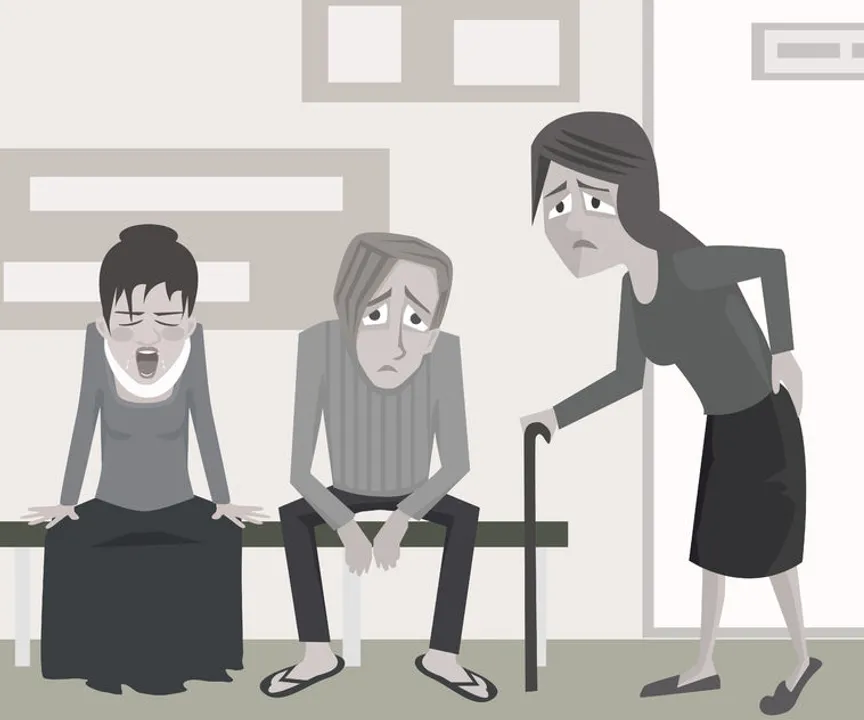Pros & Cons of Joining a Large Group Practice
Getting into a Large Group: From Man-to-Man to Zones

pixelrobot/123RF.com
Critical mass.

lightwise/123RF.com
In choosing which type of practice you want in the progression after solo practice—two-doctor, three-doctor, etc.—you’ll cross a line into what is called a large group. There’s no magic number that defines the difference between a partnership and a large group. Instead, the distinction seems to be what you’re responsible for—your own subset of patients or the combined set of all the doctors’ patients. Once you’re taking care of the “group’s” patients and not primarily your own, then you’ve ventured over a twilight zone into the relationship known as…the large group. [CUE UP: TWILIGHT ZONE THEME.]
Group effort—the bad news.

Olga Kuevda/123RF.com
In a solo practice or a partnership, you mainly take care of patients you know; in a large group you take care of everyone’s patients. During regular hours you’ll see your own, but you will spend most of your on-call work with patient’s you’ve never met. Worse, the patient you’re likely to see will have never met you, and it is you who has to prove himself or herself to the patient. Most of the time, patients are no strangers to this arrangement and things will go fine. However, the self-appointed “special” patients will grumble about not seeing “their” doctors, and you’re likely to be exposed to disapproving silence, aloofness, or even hostility. That being said, almost all patients drop their defenses once realizing you know what you’re doing. After all, they don’t want to be your pal; they just want good care.
Group effort—the good news.

Hanna Kuprevich/123RF.com
In a large group, you’ll learn more—and faster. Even better, you’ll have many colleagues and veterans to lean on in difficult cases. If you’ve become a doctor for the challenge of pathology and the more esoteric presentations, you’ll get that in a large group. In fact, you’ll see and deal with things you’re not likely to ever see in solo or small group practice.
Misery loves company.

Kurhan/123RF.com
In the matter of business, spreading the drudgery around makes it negligible by the time you’ll deal with it. If you’re entering a large group (as opposed to starting a large group), there will already be associates handling the business end. All you have to do is practice medicine.
Your ancillary personnel—nurses, receptionists, lab techs, etc.—are all likely to be “floaters,” that is, available in any area that’s needed. Therefore, unlike solo practice, if a nurse calls in sick, everyone pitches in to keep the machine going. In short, all of the annoying things about the business of running a practice are shared to the point of insignificance to you. That’s nice.
The larger the group, the more you’ll be able to distance yourself from the ledgers and the spreadsheets. Financial officers, operating executives, and administrators become necessary at some point, and the more of these that assume the helm, the more you’ll be able to do what you always intended to do—just practice medicine.
In the beginning…

Oksana Kuzmina/123RF.com
When you first join a large group, you may be assigned a disproportionate amount of call coverage. Consider it paying your dues, because you’re beginning your road toward being fully vested, and if the end-result is desirable, it won’t stick in your craw. Thankfully, according to sheer man-hours, ergs, joules, or however you measure it, it’s still going to be gentler and kinder than a disproportionate amount of work (translated: dumped on) in a small group. If you’re going from a small group to the large group, you’ll probably discover it’s even a reduction in the lopsided share of duties.
The trick to accepting the extra drudgery you’re likely to be saddled with is to know about it and its payoff before you join, so you can figure that into your algorithm for deciding to join.
See the forest for the trees.

smileus/123RF.com
As you find yourself very busy, slugging it out in the trenches with this medical challenge or that, you can’t forget that it’s a business. If you’ve come from a solo practice, no one knows this better than you. Therefore, you’ll understand it when there’s an extra “contribution” taken out your salary for that new EHR or to hire that super-duper sub-specialist in that state-of-the-art expertise that’s all the rage in your practice’s advertising. Such hits will pay off, and whereas you could never afford to venture forward with this type of risk in solo practice, a large group can take the hit in expectation of a return later. It’s like when you pay more taxes because you’re earning more; you’re still earning more.
Productivity is as productivity does.
Compensation is usually a base salary with extra thrown in based on productivity. If you come in brand spanking new, you’ll need to build up your patient base, because while you’re taking the load on your call nights and weekends, during regular business hours you’ll need to fill you schedule with a patients of your own. This means doing the best type of advertising there is—just doing good work, especially on those times on call when you’re dealing with patients of other doctors in your group.
Strange bedfellows.

Susan Richey-Schmitz/123RF.com
The large group is very political. The more persons in it, the more you’ll come across persons you’d never consider practicing with in a small partnership. Face it, there will be people you’ll outright dislike. It’s all in the numbers, and the larger the group, the more likely it’ll happen. Fret not. The large group is also very cliquey. You will gravitate toward the people you like and with whom you like practicing. And there’ll be more of them than the disagreeable ones.
In the final tally of things, the large group may take away the sovereignty you would enjoy in solo practice, but in return it gives you a better learning experience, associates to save your butt when you get into a jam, and a shared, diluted load of the business chores.
Related Posts
